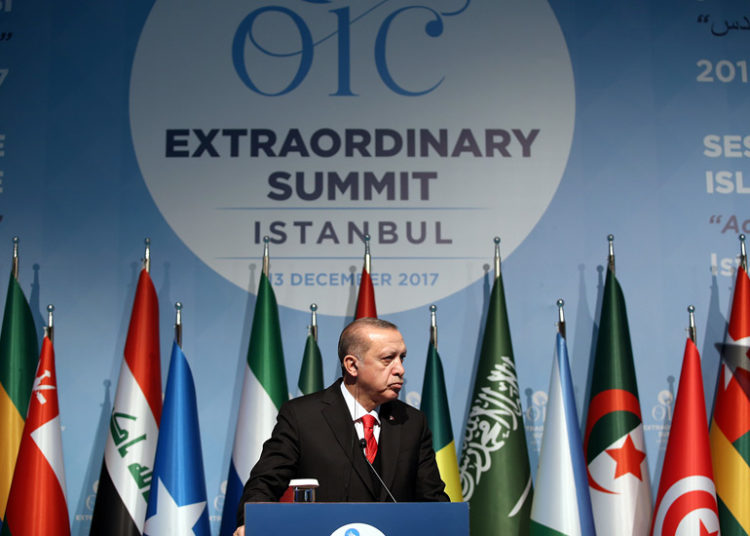Nordic Monitor
The Organisation of Islamic Cooperation (OIC) has resisted Turkey’s efforts to target critics of Turkish President Recep Tayyip Erdoğan and has prevented abuse of the platform of the largest intergovernmental organization after the United Nations.
Nordic Monitor has learned that President Erdoğan and his envoys sought the support of OIC countries to define the Gülen movement as a terrorist group, but such initiatives have been killed by OIC members and its secretariat over the past three years. This represents a major setback for the Erdoğan government, which managed to secure a political statement against the movement at the 43rd OIC Council of Foreign Ministers (CFM) in October 2016 during which resolution No 47/43-POL condemning a failed 2016 coup attempt in Turkey and including Ankara’s rhetoric was adopted.
Since then, more evidence has emerged confirming widely circulated claims that the attempt was a false flag operation orchestrated by the Erdoğan government to set up the opposition for mass persecution, consolidate all levers of power in the government and launch a military invasion into Syria. The movement strongly denied any role in the putschist attempt and called for an international probe that the Erdoğan government rejected. The Turkish government also failed to to present convincing evidence to secure the extradition of movement leader Fethullah Gülen, who has been living in the US since 1999.

Since the 43rd CFM, OIC member states have declined Turkey’s repeated requests at several OIC meetings in accordance with its charter. Article 2 of the charter, which was approved by the 11th Islamic Summit in 2008 to become the pillar of future OIC Islamic action in line with the requirements of the 21st century, underlines the “commitment of member states to the purposes and principles of the UN charter.”
The UN and its agencies do not consider the Gülen movement a terrorist organization, and UN mechanisms have time and again ruled against Turkey by declaring that movement members were targeted, prosecuted and tortured in clear violation of Turkey’s commitments and obligations under UN conventions. The movement is active around the world with a special focus on education, interfaith dialogue and community empowerment. It is led by US-based Turkish Muslim scholar Gülen, a vocal critic of Erdoğan over pervasive corruption and the Turkish government’s aiding and abetting of armed jihadist groups in Syria and other countries.
The US, Canada and European countries have also rejected the Erdoğan government’s efforts to brand the civic group as a terrorist entity and denied extradition requests based on fabricated criminal charges. Similarly, member states of the Gulf Cooperation Council, the Arab League and many members of the African Union have granted asylum to people affiliated with the movement.
Despite Article 6 of Resolution 47/43-POL urging the OIC secretary-general to follow up on the implementation of the resolution and report on it to the 44th session of the CFM, the OIC secretariat failed to present a report not only to the 44th CFM (Abidjan, July, 10-11, 2017) but also to the 45th CFM (Dhaka, May 5-6, 2018) and the 46th CFM (Abu Dhabi, March 1-2, 2019).
Since 2016 OIC institutions have also not submitted any documents detailing their work on the issue to high-level OIC meetings. Furthermore, OIC Secretary-General Ahmad Al-Othaimeen did not appoint a special representative or institution to carry out implementation of the resolution in line with Article 18 of the charter.
The 14th OIC Islamic Summit, which was attended by the heads of state and government of member states, was held in Makkah, Saudi Arabia, in May 2019. The summit, the supreme authority of the organization, was chaired by Saudi King Salman bin Abdulaziz, but Turkey was represented by its foreign minister, Mevlüt Çavuşoğlu. President Erdoğan’s absence exposed the chill in Saudi-Turkish relations and Turkey’s decreasing role in OIC platforms, once led by a Turkish secretary-general, Ekmeleddin İhsanoğlu.
The OIC is the second largest inter-governmental organization after the UN with a membership of 57 states spread over four continents. Saudi Arabia has employed a range of diplomatic strategies, in accordance with its national interests, to influence the OIC and has become the dominant voice among the member states.

President Erdoğan turned against the Gülen movement after major corruption investigations in December 2013 that incriminated Erdoğan, his family members and his business and political associates. In May 2016 Erdogan’s Turkey designated the group as a terrorist entity without any evidence that Gülen or people affiliated with the movement committed any terrorist acts. Then, the coup attempt in July 2016 was carried out under Erdoğan’s control as a pretext for the ensuing crackdown. Interestingly, Erdoğan called the failed coup “a gift from God.”
Following the abortive putsch, Turkey forced international and regional organizations to list the movement as a terrorist organization. Their assessment of the Gülen movement, however, differed noticeably compared to that Turkey, and the Turkish government’s bilateral and multilateral initiatives were rejected. So far, EU member states and the United States do not share Turkey’s characterization of the movement, nor has the US responded favorably to Ankara’s demand for the extradition of Fethullah Gülen and his supporters to Turkey.
President Erdoğan and his foreign minister continue giving the impression that the UN, EU, OIC and other organizations have classified the Gülen movement as a terrorist group in spite of decisions made by these institutions and the rulings of the European Court of Human Rights (ECtHR) and local courts in the civilized world.
In addition to the ECtHR rulings, the high courts of Romania, Bosnia and Herzegovina and Brazil recently decided that the Gülen movement has never committed any act of terrorism and that the extradition of members of the movement to Turkey may result in the prosecution or punishment of a person for reasons of race, religion, political or ideological opinion or membership in a certain social group.












